Funds of Knowledge

Funds of Knowledge
The concept of funds of knowledge is based on a simple premise: people are competent and have knowledge, and their life experiences have given them that knowledge. The claim in this book is that first-hand research experiences with families allow one to document this competence and knowledge, and that such engagement provides many possibilities for positive pedagogical actions. Drawing from both Vygotskian and neo-sociocultural perspectives in designing a methodology that views the everyday practices of language and action as constructing knowledge, the funds of knowledge approach facilitates a systematic and powerful way to represent communities in terms of the resources they possess and how to harness them for classroom teaching. This book accomplishes three objectives: It gives readers the basic methodology and techniques followed in the contributors' funds of knowledge research; it extends the boundaries of what these researchers have done; and it explores the applications to classroom practice that can result from teachers knowing the communities in which they work. In a time when national educational discourses focus on system reform and wholesale replicability across school sites, this book offers a counter-perspective stating that instruction must be linked to students' lives, and that details of effective pedagogy should be linked to local histories and community contexts. This approach should not be confused with parent participation programs, although that is often a fortuitous consequence of the work described. It is also not an attempt to teach parents how to do school although that could certainly be an outcome if the parents so desired. Instead, the funds of knowledge approach attempts to accomplish something that may be even more challenging: to alter the perceptions of working-class or poor communities by viewing their households primarily in terms of their strengths and resources, their defining pedagogical characteristics. Funds of Knowledge: Theorizing Practices in Households, Communities, and Classrooms is a critically important volume for all teachers and teachers-to-be, and for researchers and graduate students of language, culture, and edu
PRP: 444.18 Lei
Acesta este Pretul Recomandat de Producator. Pretul de vanzare al produsului este afisat mai jos.
399.76Lei
399.76Lei
444.18 LeiLivrare in 2-4 saptamani
Descrierea produsului
The concept of funds of knowledge is based on a simple premise: people are competent and have knowledge, and their life experiences have given them that knowledge. The claim in this book is that first-hand research experiences with families allow one to document this competence and knowledge, and that such engagement provides many possibilities for positive pedagogical actions. Drawing from both Vygotskian and neo-sociocultural perspectives in designing a methodology that views the everyday practices of language and action as constructing knowledge, the funds of knowledge approach facilitates a systematic and powerful way to represent communities in terms of the resources they possess and how to harness them for classroom teaching. This book accomplishes three objectives: It gives readers the basic methodology and techniques followed in the contributors' funds of knowledge research; it extends the boundaries of what these researchers have done; and it explores the applications to classroom practice that can result from teachers knowing the communities in which they work. In a time when national educational discourses focus on system reform and wholesale replicability across school sites, this book offers a counter-perspective stating that instruction must be linked to students' lives, and that details of effective pedagogy should be linked to local histories and community contexts. This approach should not be confused with parent participation programs, although that is often a fortuitous consequence of the work described. It is also not an attempt to teach parents how to do school although that could certainly be an outcome if the parents so desired. Instead, the funds of knowledge approach attempts to accomplish something that may be even more challenging: to alter the perceptions of working-class or poor communities by viewing their households primarily in terms of their strengths and resources, their defining pedagogical characteristics. Funds of Knowledge: Theorizing Practices in Households, Communities, and Classrooms is a critically important volume for all teachers and teachers-to-be, and for researchers and graduate students of language, culture, and edu
Detaliile produsului









